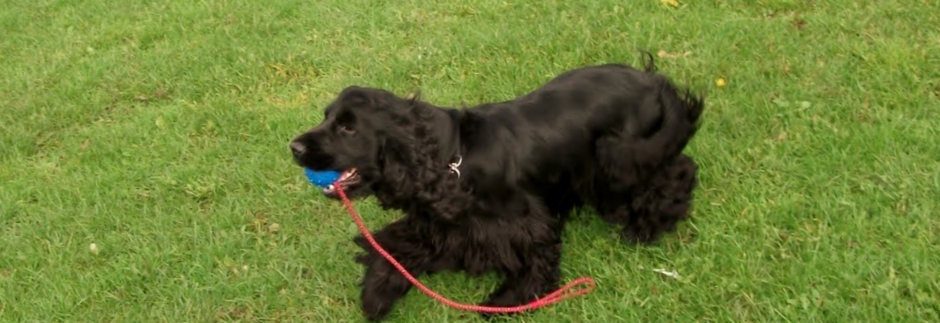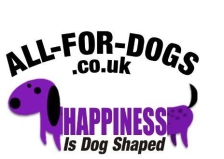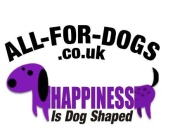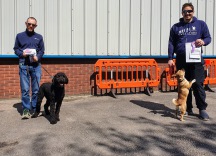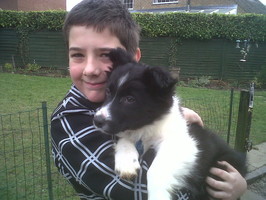Puppy Training - Advice
In alphabetical order
Biting
All puppies bite. They have very sharp needle type teeth. (milk teeth) Dogs haven’t any hands and they use their mouth to grab and hold with. Puppies bite a lot particularly as they are teething. Give your puppy a safe and sensible alternative item whenever any biting takes place.
Collar
As soon as you fetch your puppy home fit a collar with a name tag. A collar makes it possible for you to hold the dog without pinching and grabbing fur or skin. Make sure the collar is comfortable and fitted correctly. Check regularly as puppies grow very quickly. Change your collar as the puppy grows.
Diet
Ensure your puppy is getting a well balanced diet that includes the vitamins required for all round health.
Most puppies require between 4 & 5 small meals a day.
Discipline
Shouting yelling or smacking your puppy should be avoided. Puppies need to be shown by demonstration what is required of them. It is far better to reward success and where possible ignore faults. The use of an indoor kennel prevents any destruction of your home and possessions when you are unable to supervise your puppy.
Examination
Teach your puppy to get used to a full examination. This must include mouth, teeth, feet, pads, rear end and tail. When carried out with firm hands and a confident approach the puppy will enjoy the attention and accept this handling as normal.
Feeding
Get your puppy used to being handled while being fed. Do this by stroking the puppy once or twice while feeding. Don’t make a big issue of this just let the puppy get used to your presence.
Never leave uneaten food down. Allow approx. 5-10 mins. for the food to be eaten. Then remove if not all eaten. Re-try again a little later.
Grabbing Clothing
Puppies have sharp claws and can easily become entangled in clothing. Jumpers, tights are always in danger. Wear clothes that are not in constant danger of being hooked up by probing claws.
Greeting Your Puppy.
When you first see your puppy in the morning or when you come into the house restrain yourself. Don’t go overboard and excite the puppy with an over the top greeting. Be calm and controlled. Wait a few minutes and then fuss gently and take your dog into the garden for toilet duties and a little play.
Grooming
Everyday spend a few moments grooming your puppy. Use suitable equipment and make the experience pleasurable.
House Training
After food, after a sleep and at regular intervals accompany your dog into the garden. Select a suitable spot and encourage your puppy to go to the toilet. Add a command such as “be quick”, “be clean”, “hurry up” etc. Give plenty of praise as the task is being done.
Indoor Kennel (Cage or Crate)
Indoor kennels are a great asset in developing a good relationship with your dog. The benefits include quick no fuss house training. Your puppy has a secure and safe den. No worries concerning chewing when you are not able to supervise. Indoor kennels must not be used as a punishment cell.
Jumping Up
Most dog owners teach their puppies to jump up from the day the puppy arrives. Not on purpose but by responding to the appealing way puppies try to reach up with their paws. The usual response is to reward this action with love and attention. (very hard not to). Hence as the puppy grows it soon learns how to get attention. Negative response to jumping up works very well. Turn your back and ignore the puppy. As soon as the pestering stops reward with praise or titbit.
Lead
Once your puppy is used to the collar attach a lead. Get the puppy accustomed to the lead. Walk around the house and into the garden. Your lead is a great training aid. A lead can be used inside and outside the house. The puppy should not associate it with just going for a walk.
Leadership
Your puppy should see you as the leader. To help you establish this important role, undertake basic and simple training from an early age. Reward your puppy whenever a task is carried out successfully e.g. sit, wait, give a paw, come to you etc.
Playtime
All puppies need to be played with and loved. Try and play in an educational way. So that you can teach at the same time e.g. calling your dog to you, play hide and seek your puppy seeking you. Teach your puppy to sit and lie down. Avoid any games that encourage the puppy to be vocal. Barking, growling etc
Separation
Care needs to be taken that your puppy does not become over attached to you. If this occurs leaving the house or even shutting a door between you and the puppy can be traumatic. From day one make a point of not always allowing your puppy to be with you.
Socialisation
Your puppy should be introduced to people and other dogs. The world we live in is noisy and can be frightening. Sensible confident introduction to everyday life will enable your puppy to be well adjusted. Training classes will assist with socialisation.
Visitors To Your House
Instruct your houseguest not to immediately fuss your puppy. Encourage them to ignore his presence until they have been in the house some time. If the puppy is made the focal of attention jumping up and monopolising will always happen.
Young Children
Young children and puppies are not always the best mix. Puppies have sharp teeth and claws. Children get over excited and so does the puppy and the play often finishes in tears. It is usual for the puppy to take the blame for any scratching or torn clothes. I feel a puppy must not be put into a situation that can become out of control. Adults should supervise the play and make sure it does not get out of hand.
Health and Well Being.
A dog should be checked over by your vet frequently for any signs of deficiencies and have regular innoculations against the recognised diseases.
A dog must be wormed regularly as advised by your vet.
An adult dog needs worming at least twice a year.
Grooming is an important part of keeping your dog in a clean and good condition.
Regular exercise is essential.
A sensible diet will ensure good health. A fat dog is more likely to be unhealthy.
